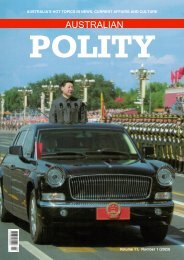Australian Polity, Volume 9 Number 3 - Digital Version
Australia's hot topics in news, current affairs and culture
Australia's hot topics in news, current affairs and culture
You also want an ePaper? Increase the reach of your titles
YUMPU automatically turns print PDFs into web optimized ePapers that Google loves.
Those of Jewish faith understand this. As Rabbi Sacks
said, “The purpose of Judaism is to honour the image
of God in other people.” Reflecting the Psalmist: people
who are fearfully and wonderfully made. This is such
a beautiful idea and one shared by many other faiths,
including my own. Appreciating human dignity also
fosters our sense of shared humanity.
Hand, to argue this point:
I often wonder whether we do not rest our hopes too
much upon constitutions, upon laws, upon courts ...
believe me these are false hopes. Liberty lies in the
hearts of men and women, when it dies there, no
constitution, no law can save it.
This means that because we are conscious of our own
failings and vulnerabilities, we can be more accepting
and understanding of the failings and vulnerabilities of
others. True faith and religion is about confronting your
own frailties. It’s about understanding your own and our
humanity. The result of that is a humble heart, not a pious
or judgemental one.
Freedom therefore rests on us taking personal
responsibility for how we treat each other, based on
our respect for, and appreciation of, human dignity. This
is not about state power. This is not about market power.
This is about morality and personal responsibility.
The Foundation of Community
This has certainly been my experience. It has also been
my privilege to appreciate the commonality of this view in
deepening my ever connections with so many other faith
and religious communities across Australia. Christians
from all denominations. The Eastern Orthodox faiths,
Maronites, Catholics, Anglicans, and then of course
Judaism, Hinduism, Muslims. Seeing the dignity in others
means we can see others as imperfect people striving
to do their best.
In a liberal democracy - there is no greater liberal
democracy than the ones that are shared here and in
Israel - human dignity is foundational to our freedom. It
restrains government, it restrains our own actions and
our own behaviour because we act for others and not
ourselves, as you indeed do here this evening. That is
the essence of morality.
Morality is also then the foundation of true community.
The place where we are valued; where we are unique;
where we respect one another and contribute to and
share one another’s lives. Where we pledge faithfulness
to do together what we cannot achieve alone. Sacks
describes this as the covenant of community.
It is the determination to step up and play a role and to
contribute, not leaving it to someone else, to another. That
is the moral responsibility and covenant, I would argue, of
citizenship. Not to think we can leave it to someone else.
But there are warnings. Where we once understood our
rights in terms of our protections from the state, now it
seems these rights are increasingly defined by what we
expect from the state. As citizens, we cannot allow what
we think we are entitled to, to become more important
than what we are responsible for as citizens.
Alexis de Tocqueville agreed. He said, “Liberty cannot be
established without morality, nor morality without faith’.
Hayek the economist said the same thing, “Freedom has
never worked without deeply ingrained moral beliefs.”
Acting to morally enhance the freedom of others
ultimately serves to enhance our own freedom. So it
is no surprise then that Rabbi Sacks concluded in his
final work, Morality, “If you lose your own morality, you
are in danger of losing your freedom.” The implication
here is very important. Liberty is not borne of the state
but rests with the individual, for whom morality must be
a personal responsibility. In Lessons in Leadership, he
quotes distinguished American jurist Judge Learned
Teddy Roosevelt argued this more than a century ago in
his famous ‘Man in the Arena’ speech. But I’m not going
to quote the section that is most known. Arguing that
going down this path of entitlements of citizenship, as
opposed to the responsibilities, is a very dangerous one,
and it indeed jeopardises national success in a liberal
democracy. He said, “The stream will not permanently
rise higher than the main source; and the main source
of national power and national greatness is found in the
average citizenship of the nation.” He also said, “In the
long run, success or failure will be conditioned upon the
way in which the average man, the average woman, does
Australian Polity 19





